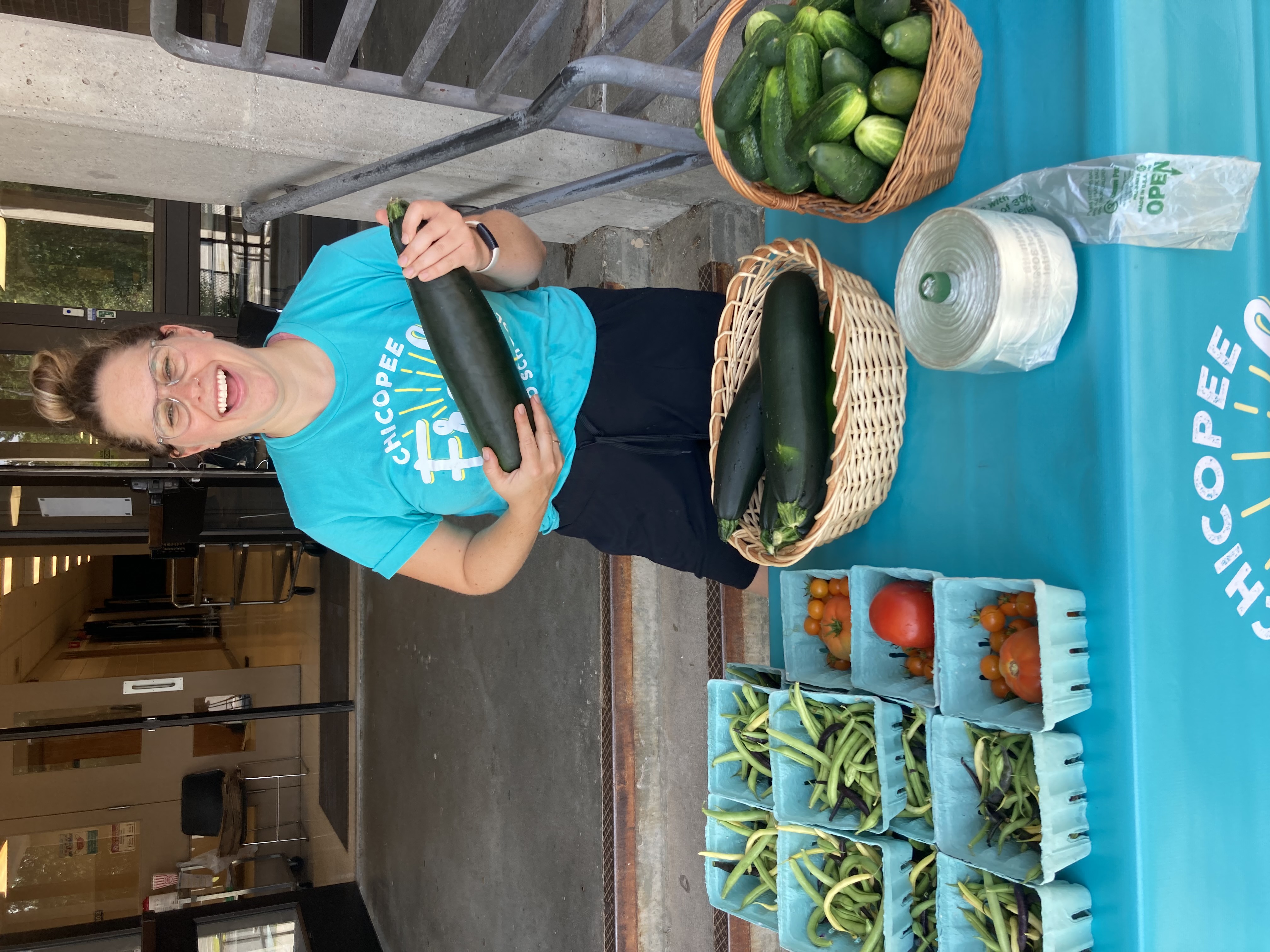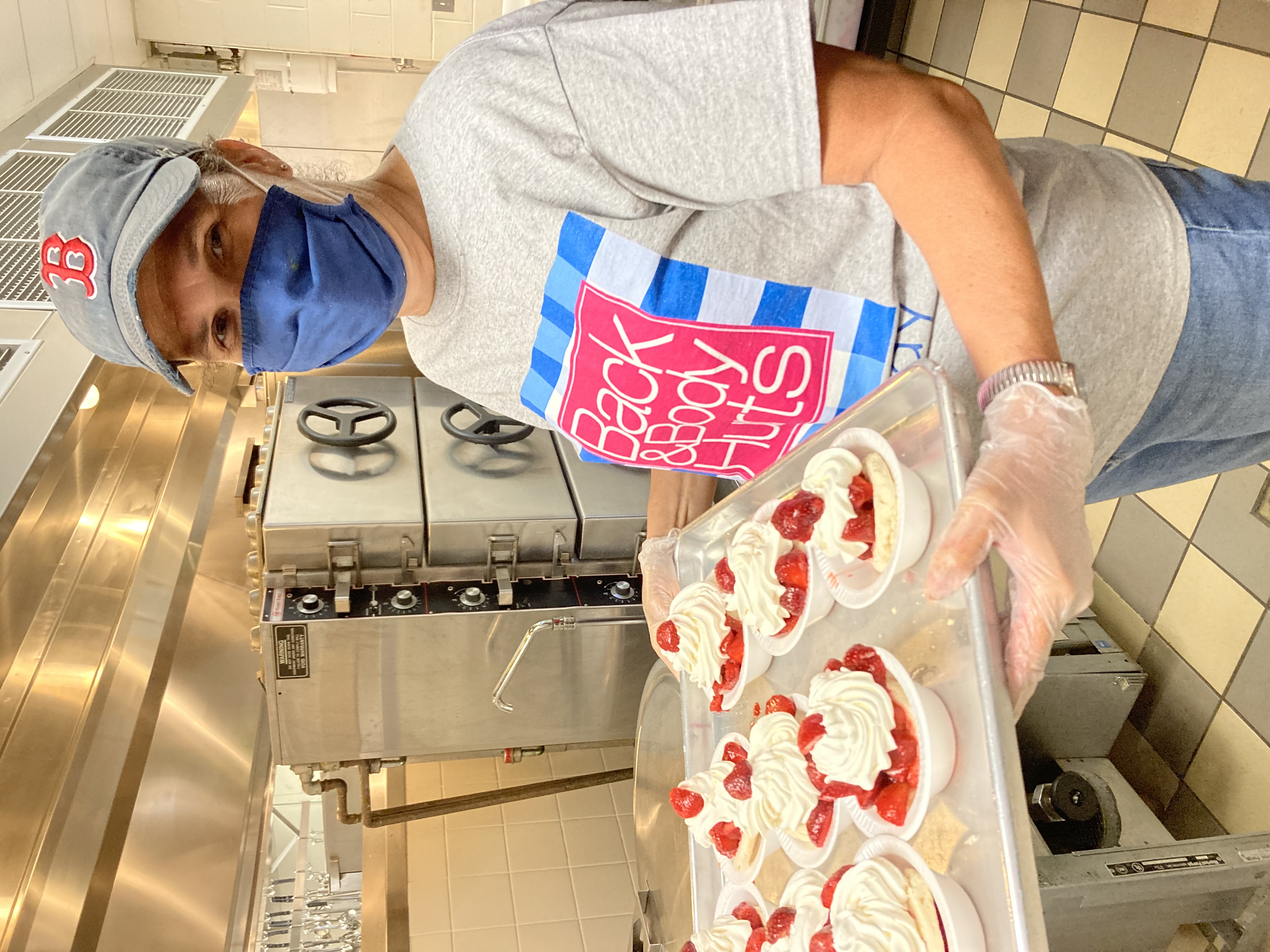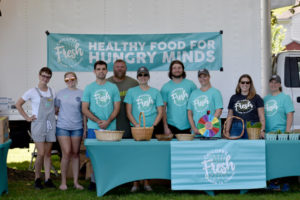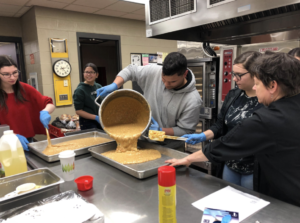Public Schools of Brookline
Sasha Palmer
Food Service Director
Public Schools of Brookline
The Public Schools of Brookline has many opportunities for students to interact with the Food service program:
How do you ensure that students are eating nutritious meals?
Brookline Public School cooks a larger portion of its menu items from scratch starting with basic ingredients. We try to source local ingredients and have utilized local organic greens for our Hyper Local Hydroponic Farmer.
How do you get your food?
Brookline is a part of a collaborative who purchases food including produce through a collaborative. This helps us in minimizing the administrative burden and helps us access locally sourced food as our vendor aggregates from local sources. We are in the process of finding additional sources to purchase produce as our vendor went out of business recently.
Are there ways that we can get more students involved in their school food system?
One of the best ways that we have seen is getting students involved in the Farm to School Program is to partner with student groups with similar passions. The Brookline Public School has a Food Justice Club that is eager to partner with the district on various initiatives such as food access, equity, and sustainable practices. We are exploring getting students involved in internship programs.
Chicopee Public Schools
Greta Shwachman
Farm To School Program Coordinator
Chicopee Public Schools
 What are some ways that students and staff interact with the work you do?
What are some ways that students and staff interact with the work you do?
We aim to engage the Chicopee school and broader community in our work whenever possible. We do this through taste tests, cooking classes, garden events, free community workshops, and more. We also share our story through social media channels such as Instagram, Facebook, and TikTok. We aim to be as transparent as possible with all members of the school community. We are currently working with high school social media interns to create TikTok videos and QR codes that link to our menus.
How do you ensure that students are eating nutritious meals?
 Apart from following USDA guidelines and meal pattern requirements, we focus on scratch-cooking whenever possible, and source fresh produce for our program. We try to menu local foods at least 2-3 days a week to ensure that students have access to nutrient dense foods as part of their school lunch. We pair local fruits and vegetables with commodity proteins to keep our menu affordable and nutritious.
Apart from following USDA guidelines and meal pattern requirements, we focus on scratch-cooking whenever possible, and source fresh produce for our program. We try to menu local foods at least 2-3 days a week to ensure that students have access to nutrient dense foods as part of their school lunch. We pair local fruits and vegetables with commodity proteins to keep our menu affordable and nutritious.
How do you get your food?
We work with a variety of conventional and local vendors to source the food for our meal program. Arnold’s Meats has been a huge help in expanding our offerings of local protein. We also have worked with Czajkowski Farms in Hadley, MA for many years to bring farm fresh produce to our menus, such as carrots, butternut squash, apples, sweet potatoes, strawberries, blueberries, peaches, and more. We are lucky that Czajkowski Farms offers processed options like carrot sticks, and is able to deliver to all 15 of our schools.
Are there ways that we can get more students involved in their school food system?
 Students can get involved in their school food system through experiences growing and cooking their own food. Our department currently supports 8 school gardens across the city. The food system is multifaceted, and there’s lots of ways to be involved. We are excited to be working with high school students to promote our program through social media, and we are always looking for passionate students to give us feedback on our meals.
Students can get involved in their school food system through experiences growing and cooking their own food. Our department currently supports 8 school gardens across the city. The food system is multifaceted, and there’s lots of ways to be involved. We are excited to be working with high school students to promote our program through social media, and we are always looking for passionate students to give us feedback on our meals.
Learn more about our Farm to School program at the ChicopeeFRESH Facebook page. We have recently created a Farm to School 101 Guide to help other districts start and expand their FTS programs. Follow us @chicopeefresh on Instagram, Facebook, and TikTok for our latest updates and projects. We are getting a food truck this fall, so follow along @curbsidecafteria!
Webster Public Schools
Ellen Nylen
Food Service Director
Webster Public Schools
 The bulk of our food comes through the USDA, where we receive unprocessed/minimally processed items such as ground beef, chicken, cheese, and canned and frozen fruits & vegetables. For the rest of our food we are part of a buying cooperative with several other Worcester County/Central MA districts and we go out to bid every year for frozen/grocery, dairy, and bread items. For produce we use our entitlement dollars with DOD Fresh (U.S -grown only); the Worcester Regional Food Hub for local produce; and another local produce vendor who shops at the wholesale market in Boston daily. We comply with the federal regulations. We try to limit the amount of processed foods we serve, and continually strive to increase the number of scratch-cooked meals.
The bulk of our food comes through the USDA, where we receive unprocessed/minimally processed items such as ground beef, chicken, cheese, and canned and frozen fruits & vegetables. For the rest of our food we are part of a buying cooperative with several other Worcester County/Central MA districts and we go out to bid every year for frozen/grocery, dairy, and bread items. For produce we use our entitlement dollars with DOD Fresh (U.S -grown only); the Worcester Regional Food Hub for local produce; and another local produce vendor who shops at the wholesale market in Boston daily. We comply with the federal regulations. We try to limit the amount of processed foods we serve, and continually strive to increase the number of scratch-cooked meals.
A simple way to get more students involved in their school food system is to have classes tour the cafeteria. Talk to the Food Service Director and Cafeteria Manager and ask questions about their jobs, which after all entail deciding what goes on the menus. Most students, especially older students, are surprised at how much food is made on site, and how much volume the cafeteria produces every day. That is a simple way to start a dialogue between students and the cafeteria. Several years ago I had a meeting with a young lady who wanted to see more vegetarian options at lunch. I asked her to quantify the demand for vegetarian meals, which she did by creating a survey at the high school. As a result the cafeteria added more vegetarian options, and the students felt heard – that’s the kind of relationship we want in order to get more students involved with school food.
Pre-Covid the Bartlett High School Farm to School Team produces a Harvest of the Month taste test event in the cafeteria, which always draws a full crowd of both students and adults. Students develop the presentation for credit in a Business Marketing class. They are tasked with brainstorming a theme for the event; creating marketing materials; working with me to select recipes; and sometimes preparing the recipes with me after school.
Phone: (413) 253-3844
Email: info@massfarmtoschool.org